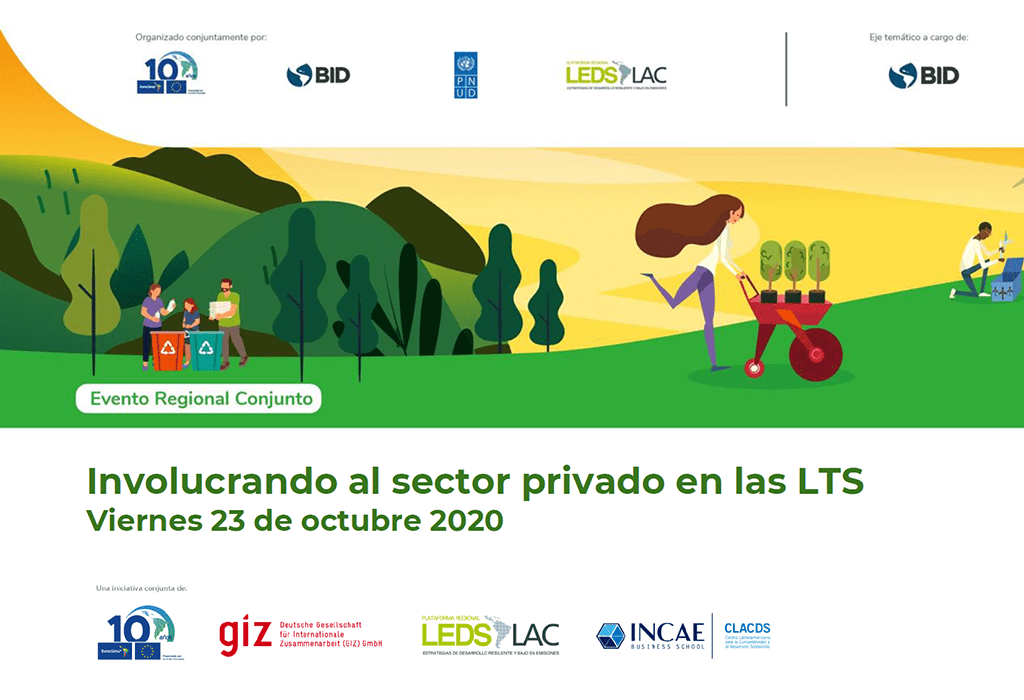The virtual discussion workshop was held on October 23 in the framework of the joint regional event Climate Action in Times of Crisis
San Jose. November 10, 2020. The Inter-American Development Bank (IDB), the EUROCLIMA+ Programme through the German Society for International Cooperation (GIZ), the Regional LEDS LAC Platform, and the INCAE Business School's Latin American Centre for Competitiveness and Sustainable Development (CLACDS), convened representatives of public institutions and business organisations, NGOs, academia and international cooperation agencies for a virtual discussion workshop on October 23 to exchange experiences and issue joint recommendations for greater private sector involvement in the Long Term Strategies (LTS) that Latin American countries are formulating in response to the call of the Paris Agreement.
The workshop took place in the framework of the joint regional event Climate Action in Times of Crisis, organised by EUROCLIMA+, IDB, UNDP and LEDS LAC, and as part of the activities of the Community of Practice on Private Sector Involvement in Climate Policy Processes in Latin America, a EUROCLIMA+ initiative through GIZ, LEDS LAC and CLACDS/INCAE. More than 60 people from a variety of sectors and countries participated, which was a key element for the dynamism of the discussion.
Considering the importance of LTSs as drivers of climate action and investment towards resilient, low emission development, it is essential to incorporate the private sector perspective from the early stages of their formulation. For this reason, the workshop partners organised this space for exchange and dialogue on how the private sector is being involved in the processes of LTS formulation in the region, in order to identify best practices, strengthening needs, and collaboration opportunities.
Maria Tapia, IDB Lead Climate Change Specialist, provided the context on the LTSs being developed with a view toward reaching zero net emissions by 2050. Ms. Tapia stated that it is technically possible for Latin American countries to reach net zero emissions by 2050 using 5 pillars: i) decarbonising electricity generation; ii) electrifying energy uses; iii) increasing the use of public transportation and non-motorised transport; iv) halting deforestation and increasing reforestation; and v) reducing waste and increasing efficiency in the energy and food sectors. She further noted that the LTSs allow for consensus building on the multiple objectives to be achieved in order for the path to net zero emissions to be clear and successful and that the private sector has an important role in their formulation and implementation.
After the presentation, a panel of experiences with private sector involvement in LTS formulation processes in the region was held, with the participation of Jenny Mager, Coordinator of the Long Term Strategy of the Ministry of Environment of Chile and Elizabeth Venegas, Director of the Environmental Dimension of the Business Alliance for Development of Costa Rica, who shared experiences of private sector involvement in the processes of formulating Chile's Long-Term Climate Strategy 2050 and Costa Rica's Decarbonisation Plan, respectively, allowing participants to learn about the points of view of both public and private actors.
Among the best practices and lessons learned by the panellists, it was pointed out that in Costa Rica, leadership from the highest levels of government and the involvement of the private sector from the design of the strategy were key in the formulation of the Decarbonisation Plan. In Chile, the establishment of sectoral goals together with the private sector made it possible to increase the ambition of these goals. The two panellists stressed the need to consider the heterogeneity of the private sector, both at the sectoral level and in other aspects related to the size, level of commitment and involvement in climate policies, among other aspects. It was recommended that the strategy formulation processes should seek to achieve a representation that reflects this heterogeneity.
After the panel, a participatory dynamic was opened with the attendees, to learn about experiences and lessons learned from other countries. Then, group work was organised to learn about the state of private sector participation in the processes of formulating LTSs and to generate recommendations to achieve a greater and better involvement. During the discussions, the importance of generating spaces, creating trust and strengthening capacities to jointly build comprehensive strategies to guide development towards a path that will enable the achievement of climate goals along with other sustainable development objectives was emphasised.
The results of these discussions and the interventions of the panellists will serve as input for the preparation of a policy brief, which will be published by the CoP in the coming months.
If you have any questions about the CoP or the Workshop, please email us. You can also visit the CoP website here and here.
Contact:
Pablo Rojas. Regional Advisor on Climate Governance and the Private Sector. EUROCLIMA+ /GIZ Programme. This email address is being protected from spambots. You need JavaScript enabled to view it.

